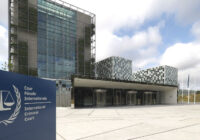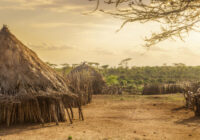This month, the African Union launched the first African passports to boost free movement of goods, services and people even as grim challenges buffet the continent.
Pan-Africanism is alive and kicking. The idea that all of Africa must come closer together has suffered setbacks but still retains resonance. This month, Rwanda hosted the 27th African Union (AU) Summit and Africa achieved a major milestone by officially launching the African passport. In her welcome remarks to the summit, Nkosazana Dlamini Zuma, chairperson of the AU Commission, presented the first African passports to Chadian President Idriss Deby, the current chairperson of the AU, and Rwandan President Paul Kagame.
Pan-Africanism and Colonialism
The high-water mark of pan-Africanism is the idea that colonial borders must go and the African people must come together. These arbitrary borders were drawn up by imperial powers in the Berlin Conference of 1884-85 and have caused untold suffering on the continent. As one of the two authors pointed out in The World This Week, “the 54 countries of Africa do not trade much with each other.” Intra-European trade is over 75% and fast-growing intra-Asian trade exceeds 25%, but intra-African trade is a measly 10%. This anemic intra-African interaction and exchange is a barrier to growth, prosperity and development.
Borders have not only impeded trade, but they have also led to conflict. Disparate peoples have been forced to coexist in rigidly defined sovereign states with centralized power structures that encourage despotism, patronage and struggle for power. Africans chose neither the states they live in nor their borders.
Naturally, pan-Africanism wants to recover the timeworn rhythms of Africa. Dismantling arbitrary European borders is a start. The African passport aims to enable the free movement of people, goods and services across the entire continent. Over time, it is likely to spur economic growth, greater integration and a renewed sense of continental identity.
Apart from economics, the African passport has immense historic significance. It has been over a century since imperial lines of oppression tore apart the so-called Dark Continent and ravaged age-old African identities. The African passport has been achieved because many remarkable people have spilled much blood, sweat and tears to come this far. This is part of the continent’s long walk to freedom and as Nelson Mandela, Africa’s greatest son, once said, “There is no easy walk to freedom anywhere, and many of us will have to pass through the valley of the shadow of death again and again before we reach the mountaintop of our desires.”
These desires for greater peace, prosperity and pride have been there for a while, but the AU is finally taking small steps toward them in the face of specters of conflict, starvation and disease that still stalk the region. The AU has come up with an ambitious-sounding Agenda 2063 that aims for “inclusive growth and sustainable development.” More importantly, it aims to “optimize the use of Africa’s resources for the benefit of all Africans.” This focus on equity in the era of inequality is most heartening. It harks back to the pre-imperial times of greater equity and harmony in African societies. It also ties into the AU’s stated goal to generate an African Renaissance.
Clouds of War Over the World’s Youngest Country
Even as the AU dreams of greater unity, South Sudan is disintegrating. The world’s youngest state is plagued by an on-and-off civil war that is casting an apocalyptic shadow over the land.
President Salva Kiir and Vice President Riek Machar negotiated a peace deal on August 2015 that came into effect in April this year. Machar even moved back to Juba, the national capital of South Sudan. Yet the peace deal has proved fragile. Fighting has broken out between Kiir’s forces and Machar’s loyalists. The Paris-based Sudan Tribune reports that over 270 people were killed near the presidential palace in Juba.
Machar has now left Juba for a secret location. He claims to fear for his safety in the capital. Unsurprisingly, both sides are blaming each other for the clash. Kiir’s subordinates claim that a text message sent by Machar’s spokesman triggered the violence. The text said Machar was being detained in the presidential palace when he was actually in a formal meeting with Kiir. Machar’s men tried to break into the palace to rescue their leader, setting off a deadly skirmish. Machar’s representative in Kenya rubbished this claim. He asserted that the killing in cold blood of two senior officers in Machar’s rebel army, followed by an unwarranted attack by Kiir’s forces during the Kiir-Machar meeting in the presidential palace, is the real cause of the bloodshed.
Whatever the truth, the reality is that South Sudan faces a tragedy. In the June edition of Africa This Month, the authors painted a grim picture of the situation in that country. As per the United Nations (UN), 4.8 million people, a third of the country’s population, are at risk of food shortages and “the risk of a hunger catastrophe” is very real. Floods have worsened the situation, making mass malnourishment and dangerous epidemics an imminent possibility. Blood and rain in South Sudan are a terrifying prospect.
Yet Kiir and Machar show no signs of backing down. Kiir has appointed a new vice president. Machar has rejected the appointment and warned of a new war. Each side claims that the other breached the peace deal. Machar has appealed to the UN and the AU to deploy troops to restore peace. Kiir opposes any such intervention. The stage seems to be set for a tragic return to conflict.
The United States has joined the AU in condemning continued fighting in South Sudan. It singled out Kiir’s forces for “raping and gang raping women and girls who have taken refuge in UN Protection of Civilian sites.” The UN has reported at least 120 cases of sexual violence in Juba. The US is promising to hold “those responsible for war crimes, crimes against humanity, and other violations of international humanitarian law” accountable. Ironically, this violence is taking place in the “African Year of Human Rights with Particular Focus on the Rights of Women” and making mockery of the AU’s declaration earlier this year.
In a speech in Kigali, UN Secretary General Ban Ki-moon declared that he was “appalled by the magnitude of the violence, the indiscriminate attacks on civilians and peacekeepers, and the immense loss of lives and suffering this crisis has inflicted on the people of South Sudan.” He called the renewed fighting horrendous and totally unacceptable. He was particularly alarmed by reports of sexual violence and killings of innocent civilians. “Enough is enough” said the UN boss.
Ban has “urged the Security Council to take action on three fronts: first, impose an immediate arms embargo on South Sudan. Second, enact additional targeted sanctions on leaders and commanders working to unravel the peace process. Third, fortify the United Nations Mission in South Sudan, UNMISS.”
Ban’s words have had some effect. The UNMISS mandate that was due to expire on July 31 has been extended to August 12. This is a mere stopgap arrangement. The UN, AU and other stakeholders have to rise to the occasion and do more to steer South Sudan from hurtling into the abyss.
Crackdown in Burundi and UN Reaction
Even as strongmen cause strife in South Sudan in their struggle for power, Burundi President Pierre Nkurunziza is causing disharmony in his country by clinging on to his office. Last year, Nkurunziza decided to run for a third term.
The high-water mark of pan-Africanism is the idea that colonial borders must go and the African people must come together. These arbitrary borders were drawn up by imperial powers in the Berlin Conference of 1884-85 and have caused untold suffering on the continent.
Nkurunziza’s decision was unconstitutional and thus did not prove to be terribly popular. A failed coup in 2015 gave Nkurunziza the perfect excuse to launch a crackdown that, according to Hilary Matfess, led to “the tragic death of democracy in Burundi.” In November, The East African reported that Bujumbura residents fled the national capital because they feared for their safety. Nkurunziza had given a five-day ultimatum to dissenters to surrender illegal weapons. In turn, dissenters feared that yielding to these demands might leave them exceedingly vulnerable to repression.
The dissidents had a point. Many of them have suffered enormously. The Office of the High Commissioner on Human Rights (OHCHR) has documented “348 extrajudicial executions and about 651 cases of torture in Burundi between April 2015 and April 2016.” The OHCHR has also expressed concern over “the significant number of arrest and detention cases involving children, who are often held in adult prisons.” So grim is the situation that more than 270,000 have fled to seek refuge in neighboring countries.
This month, the UN Security Council resolved to send a 228-strong police contingent to Burundi. This is the UN’s boldest effort to deal with the unfolding crisis in the country. Deutsche Welle has published a clear chronology of the Burundian crisis and reports that a former minister close to Nkurunziza was assassinated this month.
Naturally, Nkurunziza is not too pleased. He wants a free hand to crush his opponents. Therefore, his government has been evasive about, and averse to, the UN deployment. Burundi did not attend the AU Summit, which is quite telling. It is up to the UN and the AU to restrain Nkurunziza and prevent another African country from descending into bloodshed.
African Economy Woes
Even as the AU attempts to increase intra-African trade, the International Monetary Fund (IMF) revised growth projections “down substantially in sub-Saharan Africa” in its World Economic Outlook Update. The IMF takes the same view as the authors did last month and analyzes the effects of Brexit that “has brought waves of uncertainty crashing on African shores.”
The IMF points to challenging macroeconomic conditions in Africa’s largest economies. In June, the authors wrote about Nigeria’s “full-scale economic crisis as government revenues plummet and expenditures mount.” The IMF is forecasting the Nigerian economy to shrink and the South African one to grow by a paltry 0.1% in 2016. Other African economies are also suffering as commodity prices continue to slump. Some are predicting an upcoming upswing in commodity prices but, until that actually occurs, African economies will continue to suffer.
Africa is experiencing a sharp growth in population. As per the African Economic Outlook 2016, “three out of every four Africans still live under poor human conditions.” The continent needs strong economic growth and rapid employment generation. Yet African governments remain mired in colonial-era legislation and regressive red tape. Corruption does not help. A 2002 AU report estimated that corruption cost the continent $150 billion a year. Aid was less than a sixth of this amount even in 2008 when it reached a record level of $22.5 billion.
Suffice to say, the proceeds of growth have largely accrued to political elites who siphon off their country’s wealth like Russian oligarchs. Government expenditure is synonymous with inefficiency and waste even when it is not squandered on patronage or subjected to outright theft. Clearly, Africa needed structural and institutional reforms yesterday. Perhaps the current economic crisis will force its political elites and rapacious interest groups to bring in some long overdue reforms.
International Justice for Crimes Against Humanity
This month marked the end of the long-drawn-out trial of Hissène Habré, a former president of Chad. In the May edition of Africa This Month, the authors examined the implications of Habré being sentenced in Senegal “to life imprisonment for crimes against humanity, torture and sex crimes.”
Habré ruled a country called the “Dead Heart of Africa” with an iron fist from 1982 to 1990. His draconian regime killed an estimated 40,000 people. The authors hailed the conviction of one of Africa’s Big Men who have often gotten away with impunity for all their atrocities. It marked a major milestone in international justice in Africa. The Extraordinary African Chambers (EAC) is a pioneering legal experiment by Senegal and the AU “created to prosecute international crimes committed in Chad between 7 June 1982 and 1 December 1990.” Habré is the first former head of state tried by a tribunal set up by the AU in another African country. Hence, he is also the first of the Big Men to be convicted on African soil.
This month, the Habré trial set another milestone. The EAC ordered Habré to compensate all the victims of his crimes. The EAC has ordered Habré to pay $34,000 to every victim of sexual violence, $25,000 to everyone who was tortured or imprisoned, and $17,000 to those who suffered indirectly. Damages to victims of international crimes are a rare de facto phenomenon in international criminal law. They are rarer still when the perpetrator is given a life sentence. Yet the EAC has ordered Habré to pay compensation in his personal capacity.
The wheels of international justice are starting to turn in Africa. Perhaps they may come full circle one day.
The views expressed in this article are the author’s own and do not necessarily reflect Fair Observer’s editorial policy.
Photo Credit: Michal812
 We bring you perspectives from around the world. Help us to inform and educate. Your donation is tax-deductible. Join over 400 people to become a donor or you could choose to be a sponsor.
We bring you perspectives from around the world. Help us to inform and educate. Your donation is tax-deductible. Join over 400 people to become a donor or you could choose to be a sponsor.
Support Fair Observer
We rely on your support for our independence, diversity and quality.
For more than 10 years, Fair Observer has been free, fair and independent. No billionaire owns us, no advertisers control us. We are a reader-supported nonprofit. Unlike many other publications, we keep our content free for readers regardless of where they live or whether they can afford to pay. We have no paywalls and no ads.
In the post-truth era of fake news, echo chambers and filter bubbles, we publish a plurality of perspectives from around the world. Anyone can publish with us, but everyone goes through a rigorous editorial process. So, you get fact-checked, well-reasoned content instead of noise.
We publish 2,500+ voices from 90+ countries. We also conduct education and training programs
on subjects ranging from digital media and journalism to writing and critical thinking. This
doesn’t come cheap. Servers, editors, trainers and web developers cost
money.
Please consider supporting us on a regular basis as a recurring donor or a
sustaining member.
Will you support FO’s journalism?
We rely on your support for our independence, diversity and quality.






